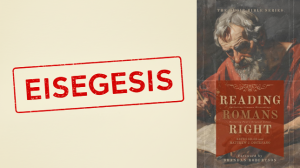
Recently, I appeared on the Heretic Happy Hour podcast. Hosted by progressive Christian Keith Giles and former progressive Christian (now agnostic) Matthew Distefano, the show tackles religious and political topics from a firmly progressive perspective. You can read my reflections on the appearance [here].
In preparation for the podcast, I purchased and began reading Reading Romans Right: Correcting Common Misreadings, Restoring Paul’s Original Intent, coauthored by Giles and Distefano. After I mentioned this, Keith asked me to write a review. Below are my thoughts on whether they “read Romans right,” “correct common misreadings,” and “restore Paul’s original intent.”
Exegesis vs. Eisegesis
The book aims to discern the true meaning of Paul’s message in the book of Romans. Biblical scholars refer to this task as exegesis: “seeking to understand what a text means or communicates on its own.” By contrast, eisegesis involves imposing “a preconceived or foreign meaning onto a text, even if that meaning could not have been originally intended” (Pocket Dictionary of Theological Terms, 1999).
To achieve their goal of exegeting Romans (and correcting faulty eisegesis), the authors must understand the text on its own terms. Unfortunately, in this regard, they ultimately fail. Reading Romans Right stands as a clear example of the very eisegesis it claims to correct.
A Word on Some Agreement
One of the primary “corrections” the authors attempt involves Justification Theory (JT) or Penal Substitutionary Atonement (PSA), commonly espoused by historically Reformed and Evangelical Protestants. Of JT, they write:
[B]y faith, one accepts the quid pro quo and believes that the two-thousand-year-old lynching of God’s son washes their sin away, then they are imputed with righteousness (i.e., saved).
As a Catholic, I also reject JT and PSA—a point the authors acknowledge. Catholicism holds that the Son offers satisfaction for our sin not in place of our punishment, but out of perfect love for the Father. However, the authors’ “correction” promotes an elaborate eisegesis in support of universal salvation. While I hope no one ends up in hell, this remains a hope, not a certainty.
Universal Salvation: Does Paul Contradict Himself?
How do the authors transform Paul into a universalist? They rely heavily on The Deliverance of God by Douglas A. Campbell and David Bentley Hart’s (a universalist) modern translation of the New Testament. Campbell contends that Paul uses a rhetorical device in Romans—a mock debate between “false teachers” (whom the authors identify as “gospel of wrath” preachers) and the “true,” universalist Paul.
Ironically, the authors engage in the very rhetorical tactic they attribute to Paul. Every doctrine they oppose is assigned to the “false teachers,” while those they support are attributed to the “true” apostle Paul—even when this contradicts clear Pauline passages like 1 Corinthians 6:9–10 and Philippians 2:12.
The Authors Pit Paul Against Peter and James
Another major issue is the authors’ portrayal of Paul as opposing Peter and James:
The tension in question is between the gospel of grace taught by Paul and the false gospel of Torah adherence taught by Peter, James…
And:
We know that Paul’s gospel was in danger of being written out of Christianity from its earliest days. Peter, James, and the Jerusalem church insisted that Gentile converts adopt Jewish markers and rites…
This eisegesis directly contradicts Acts 15, where Peter and James help remove such requirements at the Council of Jerusalem, and Acts 10:9–22, where Peter receives a vision abolishing the kosher laws. The authors’ continued endorsement of this falsehood shows a disregard for proper exegesis.
Paul as Egalitarian and Sexual Liberator?
Among the book’s most bewildering claims is that Paul was an egalitarian and sexual liberator. These assertions provide some of the clearest examples of projecting modern values onto ancient texts.
In chapter five, while interpreting Romans 1:26–27, the authors write:
Because of Christianity’s fascination with condemning the LGBTQ+ community… there is no reason to believe that what is being described here is… analogous to what we would today refer to as homosexuality.
And:
[W]hat is being condemned is the use of sexual intercourse as part of the worship of created things… idols.
However, they then assert:
Anyone who is ‘inflamed with lust’ is in sin—whether gay, straight, or otherwise.
And finally:
Straight sex is not evil. Gay sex is not evil… If the intercourse involves love and trust in God, it is not what Romans 1 condemns.
This reflects extreme eisegesis. It is implausible that a 1st-century Jewish Christian like Paul would endorse modern same-sex relationships.
The authors further impose modern categories onto Paul:
False teachers spreading a message of us vs. them, women vs. men, Jews vs. Gentiles, kosher vs. ‘unclean,’ gay vs. straight…
They claim:
Unless we believe Paul created divisions between male apostles and female ones, we must acknowledge something else is going on when he writes what, on the surface, seems like a blatant disregard for his own rules.
The Real Purpose of the Book
It is clear that the book’s goal is not to “correct common misreadings” or “restore Paul’s original intent.” Instead, it seeks to reinvent Paul by misreading Romans through a progressive lens. Though framed as exegesis, it ends up being a master class in eisegesis.
In the epilogue, the authors make their intentions clear:
Again, though, it seems too much of the Christian church is stuck in the ways of the False Teacher, so may this book be an excoriating rebuke of them, just as the letter to the Romans was 2,000 years prior. Because if we do not have a gospel that is for everyone—regardless of race, religion, socioeconomic status, gender, or sexual identity—then we do not have a gospel at all.
If you want to “read Romans right,” look elsewhere. If you want a case study in eisegesis, this book is for you.
Also, if the authors wish to invite me back to discuss their book, I welcome the invitation.
Thank you!
If you liked this article, please leave your comments below. I am very interested in your opinion on this topic.
Read The Latin Right’s other writing here.
Please visit my Facebook page and IM your questions (and follow my page) or topics for articles you would like covered.
Also, please subscribe my YouTube page for updates on upcoming articles.













